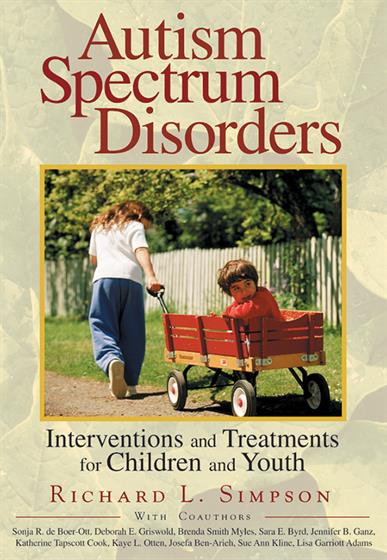
Hands-on, Practical Guidance for Educators
From math,
literacy, equity, multilingual learners, and SEL, to assessment, school counseling,
and education leadership, our books are research-based and authored by experts
on topics most relevant to what educators are facing today.
Autism Spectrum Disorders
In a clear, concise format, this resource provides the information families and school professionals need when selecting and applying effective treatment for individuals with autism spectrum disorders.
- Grade Level: PreK-12
- ISBN: 9781412906036
- Published By: Corwin
- Year: 2004
- Page Count: 264
- Publication date: June 09, 2004
Review Copies
Description
How can you best help a child with autism reach their full potential?
Autism Spectrum Disorders (ASD) present a perplexing challenge for parents and school professionals. Literally dozens of interventions and treatments are available, so how does one know which intervention strategy works best for any given child or situation? This essential resource was developed to respond directly to the extraordinary difficulty school professionals and families face in selecting and applying appropriate, effective interventions and treatments for the children in their care.
The information is presented in a straightforward and simple format, practical for finding clear answers to complex questions. For easy access, the book is organized into the following five intervention categories-Interpersonal Relationships, Skill-Based Treatment Programs, Cognitive Methods, Physiological/Biological/Neurological Approaches, and Other Treatments and Interventions. Each category contains several detailed reviews, including:
- A description of the intervention or treatment
- Reported benefits and effects associated with its use
- A synthesis of how the outcomes relate to individuals with ASD
- A discussion of who is best qualified to implement it, including when and where
- Potential costs and risks
Comprehensive in scope, this resource briefly evaluates over 40 commonly used interventions and treatments for individuals with ASD, as well as detailed evaluations of their utility and efficiency. It will assist readers in critically evaluating and choosing those methods that have the highest probability of yielding benefits for this special population.
Key features
- Author is the leading educational expert on autism spectrum disorders
- Author is Chair of the #1-rated special education program in the United States
Author(s)

Richard L. Simpson
Richard L. Simpson was Professor Emeritus at the University of Kansas. He was a member of the Department of Special Education faculty for over 40 years. While at the University of Kansas he directed numerous University of Kansas and University of Kansas Medical Center demonstration programs for students with autism spectrum disorders and other disabilities and coordinated a variety of federal grant programs related to students with autism spectrum disorders and other disabilities. He also worked as a special education teacher, school psychologist and coordinator of a community mental health outreach program. Rich authored numerous books, articles, and texts on a variety of topics connected to students with disabilities. Rich was the former senior editor of the professional journal Focus on Autism and Other Developmental Disabilities. His awards include the Council for Exceptional Children Research Award, Midwest Symposium for Leadership in Behavior Disorders Leadership Award, Autism Society of Kansas Leadership Award, and numerous University of Kansas awards and distinguished roles, including the Gene A. Budig Endowed Teaching Professorship of Special Education.

Sonja R. de Boer
Sonja R. de Boer is a Board Certified Behavior Analyst-Doctoral (BCBA-D) and obtained her Ph.D. in special education and psychology and research in education at the University of Kansas, with an emphasis on early intervention for children with Autism Spectrum Disorders (ASD). Richard Simpson was her advisor through her doctorate program. She has approximately 30 years of experience working in early childhood special education, early intervention services, Applied Behavior Analysis (ABA), with students with disabilities, and specifically children with ASD. For children with ASD, she has designed and supervised in-home intervention programs (ages 0-10), preschool programs (ages 3-6; both intensive ABA and inclusive preschools), as well as elementary school educational and behavioral programs (ages 5-12).
For more than half of her career, she has focused on serving students with ASD and their families and educators in rural communities. She is currently a faculty member for Tufts University Medical Center in Child Psychiatry and provides training and consultation around the nation regarding interventions for children with ASD. Besides the United States, she has worked with professionals, universities, non-profit organizations and families with children with ASD and other disabilities in Australia, New Zealand, Ireland, Russia, Nigeria, China, Chile, Abu Dhabi and Dubai. She is the author of the book Successful Inclusion Practices for Children with Autism: Creating a Complete, Effective, ASD Inclusion Program (currently being revised and updated for publication); Discrete Trial Training, 2nd edition (part of the How To Series on Autism Spectrum Disorders); and is one of the original co-authors of the first edition of Autism Spectrum Disorders: Interventions and Treatments for Children and Youth written with Richard Simpson in 2005.
Deborah E Griswold

Brenda Smith Myles

Jennifer B Ganz

Katherine T. Cook
Katherine Tapscott Cook is an assistant professor at Missouri Western State College in special education. She received her PhD in special education with an amphasis in autism, Asperger syndrome and behavior disorders from the University of Kansas. Dr Cook's principle research interests in the area of autism spectrum disorders include sensory integration and social skills instruction. She is a co-author of Asperger Syndrome and Sensory Issues.

Kaye L. Otten

Josefa Ben-Arieh

Sue Ann Kline

Lisa Adams
Table of Contents
Acknowledgments
Introduction
About the Authors
1. Interpersonal Relationship Interventions and Treatments
Holding Therapy
Gentle Teaching
Option Method (Son-Rise Program)
Developmental, Individual-Difference Relationship-Based Model (Floor Time)
Play-Oriented Strategies
Pet/Animal Therapy
Rationship Development Intervention (RDI)
2. Skill-Based Interventions and Treatments
Picture Exchange Communication System (PECS)
Incidental Teaching
Facilitated Communication
Augmentative and Alternative Communication
Assistive Technology
van Dijk Curricular Approach
Applied Behavior Analysis (ABA)
Discrete Trial Teaching (DTT)
Joint Action Routines (JARs)
Fast ForWord®
Pivotal Response Training
Structured Teaching (TEACCH)
3. Cognitive Interventions
Cognitive Behavioral Modification
Cognitive Learning Strategies
Cognitive Scripts
Social Stories
Power Cards
Cartooning
Social Decision-Making Strategies
Learning Experiences: An Alternative Program for Preschoolers and
Parents (LEAP)
4. Physiological/Biological/Neurological Treatments and Interventions
Scotopic Sensitivity Syndrome: Irlen Lenses
Sensory Integration
Auditory Integration Training
Mercury: Vaccination and Autism
Candida: Autism Connection
Gluten-Casein Intolerance
Megavitamin Therapy
Feingold Diet, Herb, Mineral and Other Supplements
Pharmacology
5. Other Treatments and Interventions
Art Therapy
Music Therapy
Index
Reviews
"Autism Spectrum Disorders presents the best validation criteria we currently have to offer children with ASD, and provides a blueprint for future work in this area. A long overdue wake-up call to the field, and one that is highly recommended."Gary Sasso, Chairperson, Department of Curriculum and Instruction
University of Iowa
"This excellent compendium will prove invaluable for anyone who wants to identify and evaluate commonly used treatments and interventions for individuals with autism spectrum disorders."Juane Heflin, Associate Professor
Georgia State University
"...the authors of the volume under review are to be commended for their efforts and for the resulting product. Simpson and colleagues have produced a resource that parents and professionals can consult with the confidence that the evaluations and judgments of the interventions are generally fair and reflect the scientific evidence available to date...the book fills an important need and can serve as a model and stimulus for similar work in the future."Donald P. Oswald
American Psychological Association

